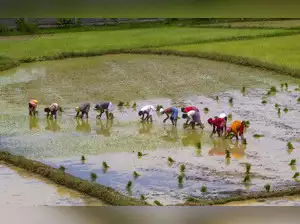Tags
West Bengal agriculture minister outlines impact on climate change on rice production
Synopsis
West Bengal Agriculture Minister Sobhandeb Chattopadhyay noted the state’s significant rice production, accounting for 14% of India’s total. Despite climate challenges, efforts to improve cultivation and diversify rice varieties, including stress-tolerant and hybrid types, have advanced, he said

Farm workers sow paddy saplings during monsoon season at an agricultural field
West Bengal Agriculture Minister Sobhandeb Chattopadhyay said on Friday that West Bengal, the ‘rice bowl of India,’ contributes 14% of the nation’s rice, featuring rich biodiversity and pointed out how climate change has intensified droughts, floods and cyclones, impacting rice and other crops.
Speaking on the recent perspectives on rice research and development in West Bengal, Chattopadhyay said, “Over 12 years, significant advances in production and cultivator livelihoods have been made, despite climate risks, inadequate seeds, resource depletion, soil health, labour issues and limited mechanisation. ,” Chattopadhyay said. “Rice has been a staple in Bengal for centuries, integral to cultural and religious events.”
“The State Government has introduced initiatives, including climate-resilient seeds, crop insurance and direct-seeded rice (DSR). Research has been laid on stress-tolerant, hybrid and bio-fortified rice varieties. Efforts to promote indigenous aromatic varieties have expanded cultivation significantly. Diverse folk rice varieties contribute to cultural dishes and health security, with research targeting diabetic-friendly and nutri-rich rice,” the state agriculture minister said.
West Bengal Panchayat Minister Pradip Mazumdar said, “There have been attempts to undermine the performance of our marginal and small farmers of West Bengal, which has a large proportion of such farmers, relies heavily on rice cultivation. Ensuring that farmers get fair realisation for their produce is crucial. When Mamata Banerjee took office in 2011, she prioritised ensuring that farmers received fair prices.”
“Our approach needs to shift from merely increasing production to managing demand effectively. Since 2012, we have been diversifying rice varieties in West Bengal to help farmers get better prices.”
Indian Chamber of Commerce organised Bengal Rice Conclave 2024 on Friday.
Former DDG-Crops-ICAR under Union Ministry of Agriculture Swapan Dutta said, “India’s agriculture sector is thriving, with significant exports. We’re the leading rice-exporting country, earning 46 billion USD from agriculture exports, which underscores the sector’s strength.
Chairman of Agriculture and Food Processing Committee( Indian Chamber of Commerce) Shrikant Goenka said, “Rice stands as a cornerstone in India’s agricultural landscape, which acts as a part of our cultural and culinary fabric. The System of Rice Intensification (SRI) method, which maintains paddy fields in a moist rather than inundated state, has demonstrated a 30% increase in rice yields while optimizing water, land, labour, and capital.”
Amresh Kumar Nayak, Director, National Rice Research Institute (NRRI), Cuttack spoke about climate change and the need for development of resilient crops, including paddy and how new technologies can be incorporated in developing rice varieties.
https://economictimes.indiatimes.com/news/economy/agriculture/west-bengal-agriculture-minister-outlines-impact-on-climate-change-on-rice-production/articleshow/112049049.cms?from=mdrPublished Date: July 26, 2024






